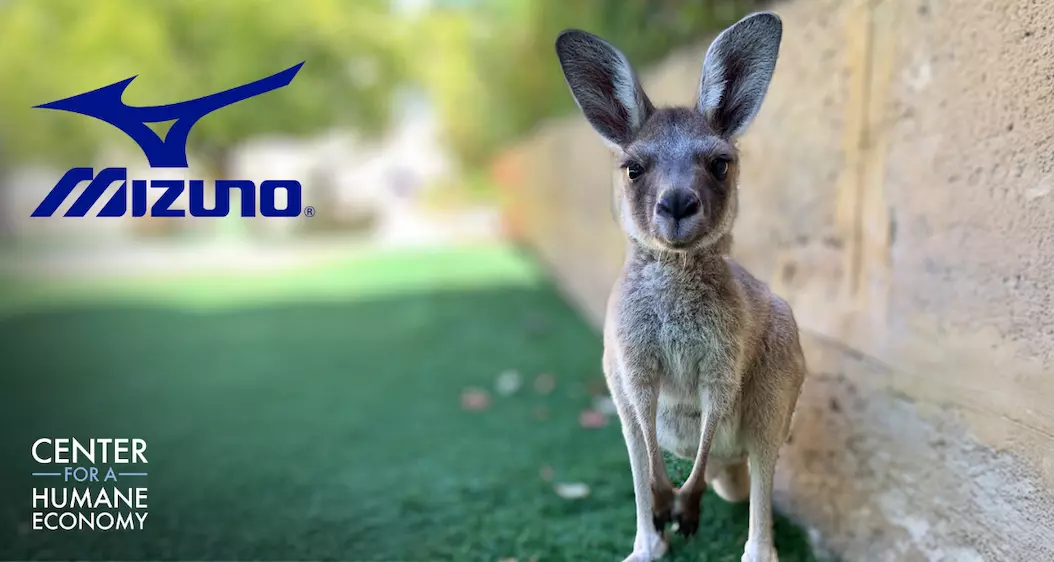Confirmation caps shift among global sportswear brands to exit the wildlife-skin trade
OSAKA, Japan — Mizuno Corporation has confirmed in correspondence with the Center for a Humane Economy that it will end its use of kangaroo leather in its athletic footwear, corroborating a report from the Financial Times that the company has become the latest global brand to exit the controversial trade. The commitment from the Japan-based company comes right on the heels of seismic and similar announcements from adidas and ASICS.
“We recognize the concerns raised by your organization regarding kangaroo leather,” said Tomoyo Matsuda, manager of sustainability issues for the Japan-based company. “At the same time, it is also true that this material has been valued by athletes and consumers for its unique combination of lightness, strength, and flexibility. That said, we are currently planning a gradual phase-out of kangaroo leather in our products, although a specific timeline has not yet been finalized.”

The rapid-fire announcement from the Germany-based adidas and the two Japan-based companies means that the top seven athletic shoe brands in the world are now on board with the core demand from the Center’s Kangaroos Are Not Shoes campaign. In 2023, Puma, Nike, and New Balance pledged to exit the kangaroo-skin trade and stop selling shoes made from the iconic marsupials. The Italy-based Diadora made a similar pledge in 2021. And in 2024, the U.K.-based Sokita ended all its offerings of soccer shoes made from kangaroo parts.
The Center for a Humane Economy, along with its affiliated organizations Animal Wellness Action and the Animal Wellness Foundation, launched the Kangaroos Are Not Shoes campaign in 2020 to drive this shift in sourcing practices.
“This is a tremendous victory for animals and for the global movement toward ethical business practices,” said Jennifer Skiff, director of international programs for the Center for a Humane Economy. “Mizuno’s decision signals that global brands can no longer ignore the brutal realities of the commercial kangaroo slaughter and its misalignment with animal welfare and sustainability values.”
Earlier this year, a review conducted by the Center for a Humane Economy found that Mizuno offered 28 models of kangaroo-leather shoes, making it the top user of kangaroo skin in the global athletic footwear market. As recently as May 2025, Mizuno had not issued any public statement regarding a phase-out, despite internal appeals and consumer pressure.
That changed following the announcements by adidas and ASICS in May. At adidas’ annual general meeting in Germany, company officials informed the Center for a Humane Economy’s president, Wayne Pacelle, that they would cease sourcing kangaroo leather, with only one product — the Copa Mundial — remaining. ASICS followed days later, committing to end kangaroo leather use in 2025 due to its focus on “ethical sourcing.”
“There’s been a welcome and overdue corporate exodus from the kangaroo skin trade,” said Pacelle. “Mizuno’s move is another important milestone in our work to defund the commercial shooting operators who slay kangaroos in the dead of night and orphan hundreds of thousands of joeys in their hail of gunfire.”
The Center for a Humane Economy had recently escalated pressure on Mizuno, launching a letter-writing campaign targeting Japanese consumers and planning international demonstrations. Those actions now appear unnecessary as Mizuno joins the ranks of companies embracing change.
“We commend Mizuno for cutting ties with the vile kangaroo wildlife trade,” said Alyssa Wormald, president of the Victorian Kangaroo Alliance. “This outcome wouldn’t have happened without the tireless campaigning of Kangaroos Are Not Shoes.”
Skiff noted that all seven of the world’s top athletic shoe companies have now committed to exiting the kangaroo leather market since the campaign began. Puma led the way in 2023, followed by Nike, New Balance, and now adidas, ASICS, and Mizuno in 2025.
“The pace of reform is remarkable,” said Skiff. “With this commitment from Mizuno, we are seeing the collapse of an industry built on the backs of Australia’s iconic wildlife.”
The Center for a Humane Economy credits the campaign’s global coalition — including Their Turn, SPCA International, the Animal Justice Party in Australia, Animals Australia, and dozens of other partners — with creating the momentum behind this historic shift.
Learn more and take action at KangaroosAreNotShoes.org.
Photo by Jennifer Skiff, director of international programs for the Center for a Humane Economy.

